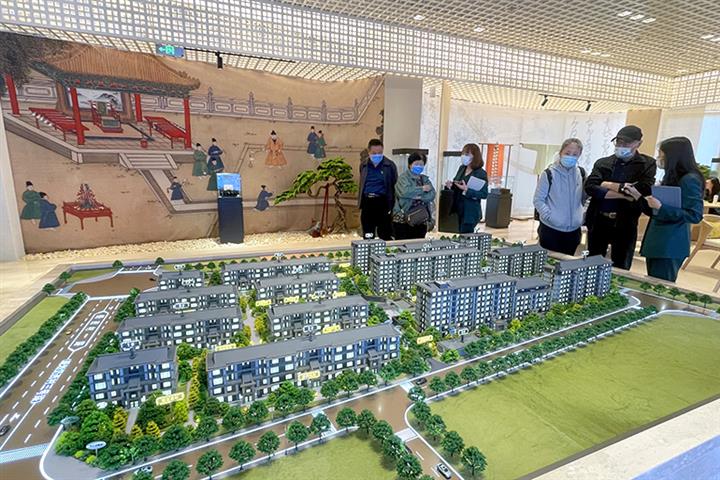 Home Loan Rates Fall Below 4% in Some Chinese Cities Amid Policy Easing
Home Loan Rates Fall Below 4% in Some Chinese Cities Amid Policy Easing(Yicai Global) Oct. 11 -- Amid general easing of real estate market policies, many cities in China have reduced the lower limit of home purchase commercial loan rates and housing provident fund loan rates, with the minimum interest rate for first-home loans in some cities dropping below 4 percent.
According to incomplete statistics from the China Index Academy, as of Oct. 8, many cities, including Wuhan in Hubei province and Qingyuan and Jiangmen in Guangdong province, had lowered the lower limit on rates of commercial loans for borrowers’ first apartments.
Wuhan was the first provincial capital city to reduce the lower limit of commercial loan interest rate, with the floor rate of the first-home loan adjusted to 40 basis points below the loan prime rate from 20 BPs below LPR. As a result, some banks in Wuhan have begun to adopt a first-home loan interest rate of 3.9 percent.
More cities are expected to follow suit, with the actually implemented home loan rate touching a historical low, Chen Wenjing, market research director at CIA’s index division, told Yicai Global.
Living condition
Such a scenario, along with other policies encouraging home purchases, will effectively stimulate the needs of locals who haven’t bought an apartment and seek to improve their living condition, Chen pointed out.
Reduction of housing provident fund loans rates is more widespread. The four first-tier cities, namely Beijing, Shanghai, Guangzhou and Shenzhen, have all lowered the rates to 3.1 percent for locals after the week-long National Day holiday, which ended on Oct. 7.
The main catalyst for the reduced apartment loan rates is a notice issued by the People’s Bank of China and the China Banking and Insurance Regulatory Commission before the holiday, which allowed cities that meet certain conditions to adopt lower rates of individual housing commercial loans for people buying first apartments, effective in the last three months of 2022.
The PBOC even cut the housing provident fund loan rates used to pay for borrowers’ first apartments, a first such move since Aug. 2015.
The decrease in first-home commercial loan rates this time is larger than before though there are restrictions concerning the period and in which areas such reduction is effective, Wang Qiuyun, a real estate analyst at Galaxy Securities, said.
Market expectations
Relevant policies directly aim to stabilize expectations as well as the market and the economy and may thus help repair property market expectations faster to enable the market enter a virtuous circle, per a research note from Guo Zhen, a property analyst from GF Securities.
The new policy will help stimulate recovery of real estate sales in middle-sized and second-tier cities the most, Guo said.
However, research notes by various brokerages suggest that it will take time for the new stimulus policies to have real effect on the market.
Given that market conditions remain weak as a whole, regulators may need to issue more stimulus policies in the fourth quarter, such as easing various purchase restrictions in core cities and increasing support for developers to obtain land, they said.
“Local governments are expected to continuously adjust policy measures based on the actual recovery of the local market,” Qi Dong, a real estate analyst at Kaiyuan Securities, noted in a research note. “The property sector is set to return to year-on-year growth in the fourth quarter.”
Editors: Tang Shihua, Peter Thomas